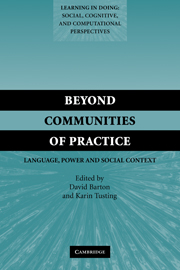Book contents
- Frontmatter
- Contents
- List of Contributors
- Series Foreword
- Introduction
- 1 Literacy, reification and the dynamics of social interaction
- 2 Language and power in communities of practice
- 3 Mediating allegations of racism in a multiethnic London school: what speech communities and communities of practice can tell us about discourse and power
- 4 “I've picked some up from a colleague”: language, sharing and communities of practice in an institutional setting
- 5 The person in the doing: negotiating the experience of self
- 6 Communities of practice and learning communities: do bilingual co-workers learn in community?
- 7 Moving beyond communities of practice in adult basic education
- 8 ‘Communities of practice’ in higher education: useful heuristic or educational model?
- 9 Communities of practice, risk and Sellafield
- 10 Semiotic social spaces and affinity spaces: from The Age of Mythology to today's schools
- Author Index
- Subject Index
- LEARNING IN DOING
- References
Introduction
Published online by Cambridge University Press: 24 November 2009
- Frontmatter
- Contents
- List of Contributors
- Series Foreword
- Introduction
- 1 Literacy, reification and the dynamics of social interaction
- 2 Language and power in communities of practice
- 3 Mediating allegations of racism in a multiethnic London school: what speech communities and communities of practice can tell us about discourse and power
- 4 “I've picked some up from a colleague”: language, sharing and communities of practice in an institutional setting
- 5 The person in the doing: negotiating the experience of self
- 6 Communities of practice and learning communities: do bilingual co-workers learn in community?
- 7 Moving beyond communities of practice in adult basic education
- 8 ‘Communities of practice’ in higher education: useful heuristic or educational model?
- 9 Communities of practice, risk and Sellafield
- 10 Semiotic social spaces and affinity spaces: from The Age of Mythology to today's schools
- Author Index
- Subject Index
- LEARNING IN DOING
- References
Summary
The concept of communities of practice, developed by Jean Lave and Etienne Wenger (Lave and Wenger 1991, Wenger 1998) as a central idea in situated approaches to learning has been taken up across social, educational and management sciences. It has been used, applied, criticised, adapted and developed by a wide range of researchers in these fields. It is currently one of the most articulated and developed concepts within broad social theories of learning.
This book consists of ten specially commissioned chapters, brought together as a coherent volume. Each chapter examines a specific aspect of the concept of community of practice, examining it in depth and developing it in some way. The title Beyond Communities of Practice is to be taken in two senses. Firstly, the book takes Wenger's 1998 Communities of Practice book as its main reference point, and it examines learning situations which are broader than the very specific notion described in the 1998 book. Secondly, this book goes beyond the notion of communities of practice in developing the concept in several ways. The key contributions are framings provided by theories of language, literacy, discourse and power and understandings of the broader social context in which communities of practice are located.
THE CONCEPT OF COMMUNITY OF PRACTICE
The starting point for the idea of a community of practice is that people typically come together in groupings to carry out activities in everyday life, in the workplace and in education.
- Type
- Chapter
- Information
- Beyond Communities of PracticeLanguage Power and Social Context, pp. 1 - 13Publisher: Cambridge University PressPrint publication year: 2005
References
- 45
- Cited by



